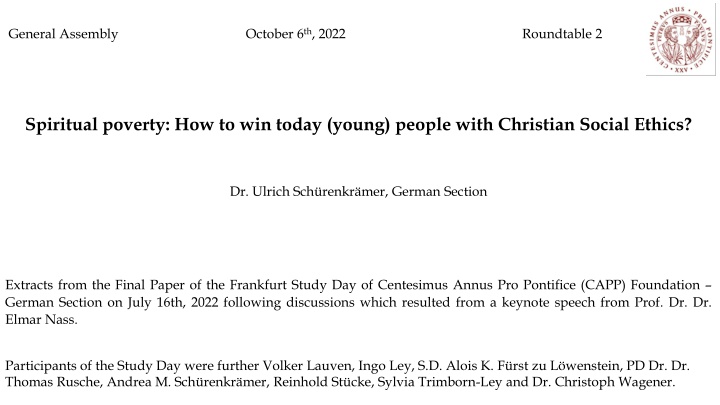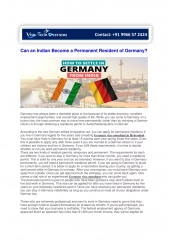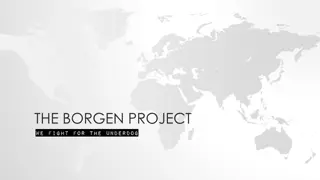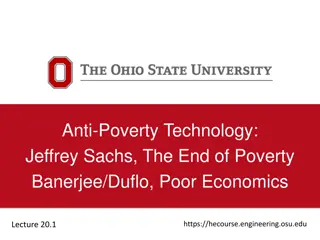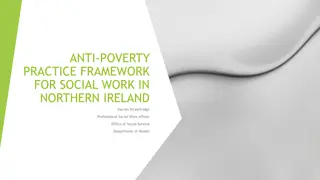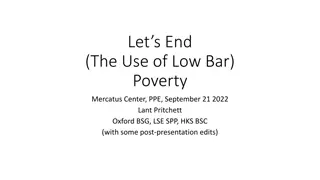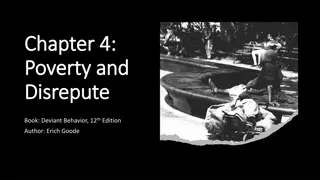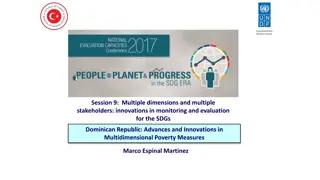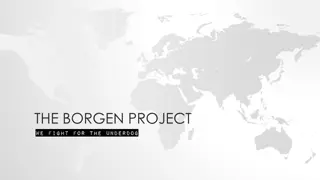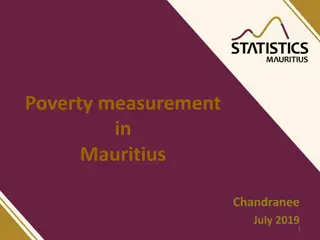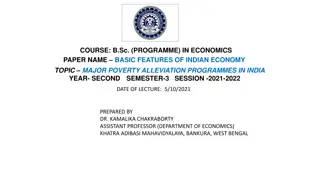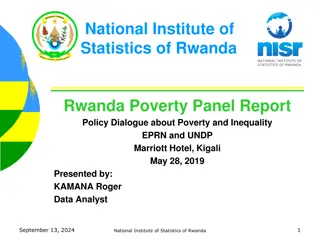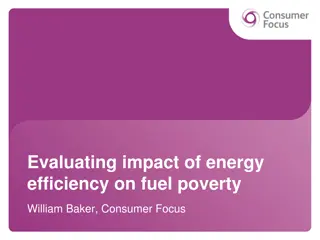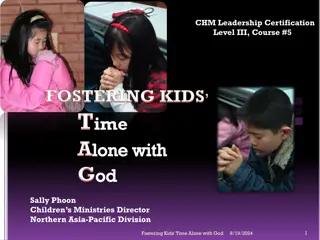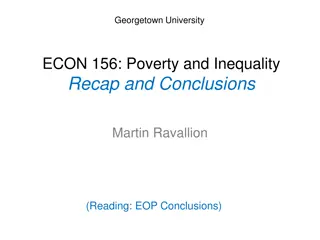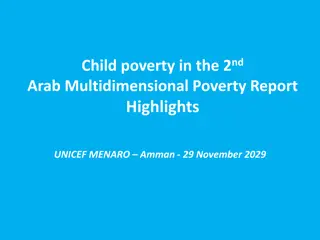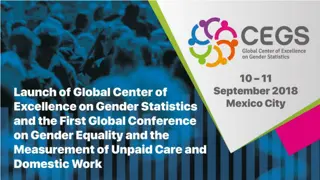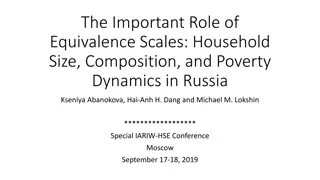Addressing Spiritual Poverty and Decline of Christianity in Germany
Germany, a wealthy nation, grapples with spiritual poverty as seen in the decline of Christianity. The Catholic Church's rich Christian Social Teaching offers values and principles crucial in combating this trend. Despite challenges like abuse cases and declining church attendance, there is potential for evangelization to engage with today's youth and address the growing disconnect. Awareness and application of Christian ethics in social issues can play a key role in rejuvenating faith and addressing spiritual poverty.
Download Presentation

Please find below an Image/Link to download the presentation.
The content on the website is provided AS IS for your information and personal use only. It may not be sold, licensed, or shared on other websites without obtaining consent from the author.If you encounter any issues during the download, it is possible that the publisher has removed the file from their server.
You are allowed to download the files provided on this website for personal or commercial use, subject to the condition that they are used lawfully. All files are the property of their respective owners.
The content on the website is provided AS IS for your information and personal use only. It may not be sold, licensed, or shared on other websites without obtaining consent from the author.
E N D
Presentation Transcript
General Assembly October 6th, 2022 Roundtable 2 Spiritual poverty: How to win today (young) people with Christian Social Ethics? Dr. Ulrich Sch renkr mer, German Section Extracts from the Final Paper of the Frankfurt Study Day of Centesimus Annus Pro Pontifice (CAPP) Foundation German Section on July 16th, 2022 following discussions which resulted from a keynote speech from Prof. Dr. Dr. Elmar Nass. Participants of the Study Day were further Volker Lauven, Ingo Ley, S.D. Alois K. F rst zu L wenstein, PD Dr. Dr. Thomas Rusche, Andrea M. Sch renkr mer, Reinhold St cke, Sylvia Trimborn-Ley and Dr. Christoph Wagener.
Poverty exists and it exists in various forms. Germany is the fourth largest economy in the world, ranking # 6 in the Human Development Index among 189 nations and No. 17 wealthiest among 193 nations. Material and financial poverty - in the absolute definition eradicated is defined in relative terms as less than 60% of the median income. A strong welfare system is in place for the precarious members and those who need help, like the homeless, get support from a wide range of public and private charity organizations, including church institutions. Germany is caring about the poverty in other parts of the world and supports with development aid in the amount of several Billions Euro each year. The German churches collected taxes and further income of more than 12 bn Euro in 2020. The Catholic church alone contributes about 850 mn Euro each year through its various vehicles like Miserior, Adveniat, Renovabis or else to projects in need around the world to eradicate poverty and promote sustainable development and peace.
However the current handling of abuse cases and the confrontation around the synodal way discussing structural and organizational issues put the Catholic church in Germany into a crises mode. This has been mirrored by more than 200.000 leavers per year since 2018.The number of leavers hit a record with 359.205 in 2021. By the way, the situation in the protestant church with a similar number of more than 200.000 leavers in the last eight years, and 280.000 leavers in 2021, is not different. Thus the number of Christians is in decline in Germany and has fallen below 50% of the population of about 84 Million people in March 2022. And only 10% of these Christians attend the church services on Saturday or Sunday!! Germany s poverty is the spiritual poverty. In deed what is missing is the evangelization.
Christian Social Teaching of the Catholic Church (CST) is immensely rich. Its basic values like human dignity, justice, freedom or common good, its social principles of personality, solidarity, subsidiarity and sustainability and its social virtues like mercy, social love and irenic living together (as a proprium of the Catholic social doctrine, in contrast to a purely rational or economic or constructivist ethics) are a treasure. CST is firmly anchored and recognized in our society, namely in our German constitution with Art. 1 Clause 1 Die W rde des Menschen is unantastbar ( Human dignity is inviolable ) or with the social bonding of private property, but large parts of society are not aware of where this is coming from. People appreciate the social values, principles and virtues without knowing that they are Christian based.
Challenges and Chances It is important to realize that the current Christian church crises is a German phenomenon. Worldwide the Catholic church is growing. The challenges in Germany are numerous and have to be mastered, to get back on the right track. For time reasons I will focus only on one. It is misleading and wrong to communicate the abuse cases in a never-ending sequential mode over time from one diocese to another, because such a dragging ensures revolving negative communication in the media. The abuse scandal must be radically uncovered in one swoop for the whole of Germany and consistently prosecuted. Lack of credibility is the biggest problem for the Catholic church in Germany.
Challenges and Chances In confidence of the treasure and the power of the Christian social doctrine it is helpful to concretize the winning themes and to focus on strength. It is worthy and right to communicate the Christian conception of man as a great treasure in opposition to those ideologies which relativize human dignity, such as 1.) communism, in which dignity is awarded by the party; 2.) utilitarianism, which makes dignity dependent on considerations of utility and calculates it in monetary units (as in the rationing debates of the pandemic); to help the poor and disabled because of human dignity, the only reason and not because of social thread potential; to tackle the preservation of creation as a core task and to implement it on a Christian foundation; CST has contributed significantly to the concept of social market economy, which reconciles the market with social humanity. Now we have the new challenge of integrating the integrity of creation into this idea of order, as Pope Francis proposes.
Challenges and Chances Further it is worthy and right to take intergenerational justice into account, also in view of the ever-increasing mountains of fiscal debt that we are leaving to future generations; to ask the question honestly: what is family today and how should it be lived in the future? to ask about the future of good care, which affects us all. Young people ask: what do I owe to my parents? to ask for the just peace. Young people in particular are committed to peace ethics.
Initiate Solutions with Strategies and Tactics: Ventilation and Lighthouses (1) Credibility, exploring social life as culture of togetherness, talking about God, setting an example, being a beacon - these are central tasks to win (young) people today for faith and church again: We should not only ask the disappointed why they leave the church. Rather, we should ask (young) people why they have stayed in the church despite many social inquiries and hostilities ("Customer" retention survey). Research into the relationship between what (young) people need and what the church and faith could offer. Such a research project is already running in Cologne and should be finished at the beginning of 2023. Like Pope Francis, we see virtues of faith as an essential way to change the world for the good. In worship, we should radiate more joy.
Initiate Solutions with Strategies and Tactics: Ventilation and Lighthouses (2) We want to bring more people to CAPP and embrace them. Every believer should be a fisherman, go outside and talk about his faith. Our Catholic faith is a lighthouse for ethical orientation, because we have the Christian image of man as a source of light. We must think in terms of implementation and involve networks, religious orders, schools, universities and German professional congregations. Implementation does not have to reinvent the wheel. We can and should value and explicitly encourage very concrete ideas for tactics and best-ofs from the wealth of experience of committed Catholics. Testimonials are a huge treasure that we must make use of, like members of our Foundation.
There is nothing good, unless you do it We are planning a multi-project/program/initiative "Lighthouse" (in German: Leuchtturm ) as a concrete format and as concrete events realizing that there are three levels which we have to differentiate if it comes to recommendations of action. Macro level of the church and the society: the Catholic church as a lighthouse. How can our beloved church be again the lighthouse for our society as well as in politics and economy? Meso level of the organization: CAPP as a lighthouse. How can we worldwide and in Germany as a papal foundation be a lighthouse to disseminate CST? Micro level of the individual: men as lighthouse. How can each of us as practicing Christian be a lighthouse in telling about our faith in everyday life, family, work and society? While it is not ours or our intention to make recommendations of action to the macro level, we feel that we can contribute to the meso and micro level, also by enlisting church shepherds as mouthpieces to be more inclusive to youth.
Our Lighthouse for CST in Germany shall encompass: The development of a certified training course on CST to promote leadership and management competences in private and public corporations, non-governmental organizations (NGOs) and church institutions in close cooperation with a German university and CAPP. The organization of a Conference in 2023 on sustainable business management/impact investing based on Christian leadership ethics (including virtue ethics, integrity of creation, peace etc.) in promotion of CST. The hosting of a series of fireside chats with testimonials around megatrends and the principles of CST. The gearing of our future meetings on the topics and together with the young generation in dissemination of Christian Social Teaching.
